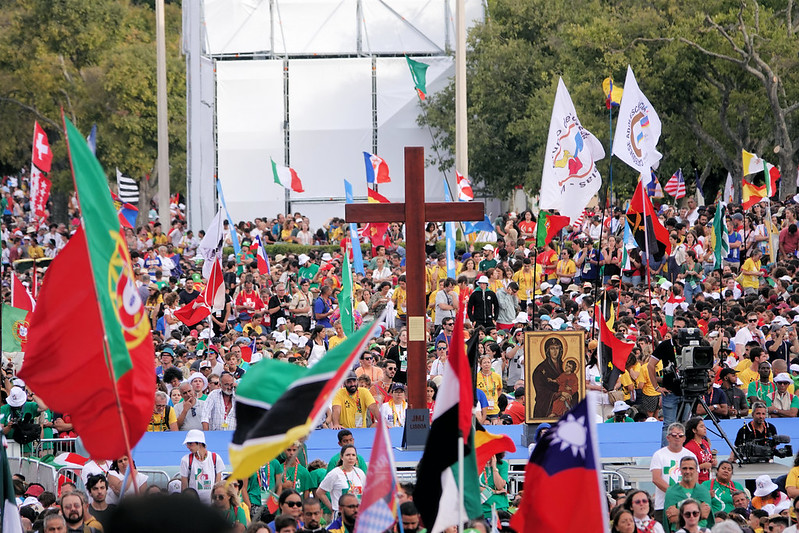
Bishop Peter ordains Paul Raynes to the diaconate
August 2, 2023
Bishop announces East Anglian Caritas festivals
August 3, 2023Young Diocese of East Anglia pilgrims in Portugal for World Youth Day, spent their second full day in Lisbon and attended the first of the Rise Up catechesis sessions. Beth Desborough and Jess McCall report.
World Youth Day – Day Eight, August 2
Jess writes:
Today we had our first Rise Up catechesis session of the week. We got the metro and were together with several thousand other English-speaking pilgrims including those from Australia, America and other groups from the UK.
We heard a wonderful talk from North American Cardinal Seán Patrick O’Malley, currently Archbishop of the Archdiocese of Boston and a Council of Cardinals adviser to Pope Francis. It included the message that St Paul tells us that the 10 commandments are written in our hearts and that to live a fully human life we need to follow them.
He went on to say that being part of a worshipping Catholic community is an important part of this and that we are charged with carrying on Jesus’ mission, we do this by being a witness to Him in our lives. He told us that we can learn discipleship the same way you learn a language, by being part of a community that practices it. Cardinal O’Malley went on to say that real success is achieved by giving ourselves as a gift to God and each other.
The talk was really powerful as it included a mixture of knowledge and learning as well as giving us practical things to go away and do in order to make ourselves better disciples and it encouraged us to become embedded in our communities in order to achieve this.
Cardinal O’Malley then celebrated Mass with us all.
Later, many of the East Anglia group went to hear Christopher West of the Theology of the Body Institute talk about the Theology of the Body, based on the work of the same name by John Paul II.
Beth reports:
We set off straight after catechesis and Mass to seek out food before gathering outside the venue two hours before it was due to start to guarantee our places after missing it the day before. When we arrived however, the queue was lengthy and we feared we wouldn’t get in. The wait paid off and we were able to get in.
West started the conference with a quote by CS Lewis: “I find in myself a desire which no desire in this world can satisfy, the most probable explanation is that I was made for another world.” West went on to discuss how we are not something but someone and how this small difference impacts how we view each other and in turn respect each other. This he linked to Matthew 13:13 “they look but they do not see”.
He elaborated that when you look at someone you only see their body. They may be aesthetically attractive but this will change and so it’s not a reliable thing to love someone for. You have to see them and see their soul and who they truly are and that’s the love that you must have for people; that they are deeper and more than they appear to be. He used the analogy that we are like the ocean and you must dive deep to understand people and continue to love them, but also emphasised that you must also let people dive into you; that it’s a joint task to grow before turning it to God. God knows all about us but until we let him in we cannot grow with him.
West then discussed how we can find joy in God’s creation and how that creates religious experience but how material things, although they are God’s creations, will only satisfy this hunger we have for so long and that the only way to fill this longing is through God. He calls this “Eros”. “The Gospel invites us not to repress erotic desire, but to experience the fullness of ‘eros’ which implies the upward impulse of the human spirit towards what is true, good, and beautiful, so that what is ‘erotic’ also becomes true, good, and beautiful.” – St John Paul II.
West elaborated further, saying that we used to believe that there were two ways we could deal with this longing for eros. Suppressing our desires or releasing them but in fact, he explains, we can direct them towards the Lord. He uses the analogy of a rocket to explain this. Man was created to fly upwards and original sin directed us off course but through Jesus’ sacrifice we were redirected up to the stars. Mortal desires (sex, drugs, drinking, porn) prevent our path from being corrected and only through God’s eros love can we be directed back on course. This analogy was inspired by the etymology of “disaster” which West explained means to be directed away from the stars: a rather creative analogy in my mind.
Pictured above are some East Anglian pilgrims mixing with others at the Rise Up catechesis session.
You can follow the group’s progress on social media at https://twitter.com/rceastanglia and https://www.facebook.com/catholiceastanglia/
See below for the latest picture gallery:
Sign up for a regular enews bulletin at www.rcdea.org.uk (see form on left-hand side of this page).





